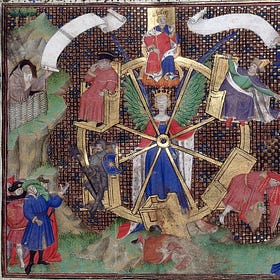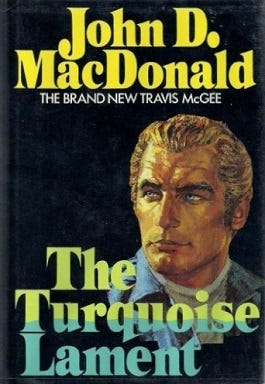This is part 2 of an extended essay about democracy in 2023, laying out the pessimistic case. Part 1 is here.
There is no will of the people. Individuals have political needs, like freedom, prosperity and security, but no political will, because in general they have no coherent idea how to bring those things about. The job of a political system is to empower leaders who do know how to.
The basic critique of democracy from this point of view is that it is an over-expanded club. Power has been handed out to so many people that it has become useless:
A pattern in world history
Here is something that happens a lot. A group of people share a resource in common. The group starts off small. But gradually it grows. Then this process picks up speed. As more and more people are allowed into the group, the value of membership goes down. Eventually, the group becomes a club that is not worth joining. Then another, smaller group, perha…
Perhaps the driving force behind this was the era of citizen armies, when democracy was held out as a reward for the masses who mobilized. Anyway, the democratic voter is, as Schumpeter put it, a member of an unworkable committee, the committee of the whole nation. The political result is that nobody is in charge.
Nobody in charge
Nobody is in charge because there is no reward for giving people the political goods they need. Over a single democratic government’s time horizon, large-scale plans are not going to come to fruition. So there is no incentive to plan. As William Niskanen put it, quoting John Macdonald:
The whole hotel… has a secondary infection called No Ownership. In other words, management has a contract without a piece of the action.
Instead, politicians get rewarded for catering to people’s whims. For an activist, educated minority, these whims are structured and thought-out enough to be called an ideology, and people with such ideologies form the membership of political parties. But they are rarely structured and thought-out enough to make a coherent plan of action, the way a person can plan to renovate his kitchen. They are more like religions. For the majority, they really are just whims. Today’s outrage follows yesterday’s enthusiasm.
At best, democratic politicians stand at the head of a great church, with subtle theologians, simple believers, and great public rituals that bring both together. At worst, which is closer to where we are today, they are cheap revivalist showboaters, catering to a big tent of suckers, gawpers and the mentally ill. The key skills to do this job well — and some practitioners are very skilled indeed — do not overlap much with the ability to make competent policy.
Donald Trump recommends drinking bleach: great showmanship, bad policy. Worse still, we found out during COVID that re-election could be won with policies that literally killed you. It was like a First World version of the alleged election slogan of Sierra Leone’s Revolutionary United Front: “we cut off your hands, so vote for us”.1
The normal result of nobody being in charge is less bad than that. It just means elected politicians are incapable of making policy. Nature abhors a vacuum. In the US, the substitute for a Congress which can’t get anything done is the Presidential administration. In the UK it is the civil service. Neither setup corresponds to the ideal of the rule of law made by elected legislators.
Michael Gove, a British politician, infamously said that the country was “tired of experts”. The phrase nicely encapsulated, and enflamed, a debate between partisans of expertise and tribunes of the people. But this is a false opposition. Experts should be the servants of politicians, not their rivals. When politicians are incompetent, they can no longer challenge experts. This means they cannot learn from them. They can only either ignore them, or submit wholesale to whatever they are told. During the pandemic, many US politicians ignored experts, and made it fatally popular to stay unvaccinated. In Europe, most politicians submitted, and went along with lockdowns that were much too strict.
It hasn’t always been like this. There have been times when politicians have been led by the median voter towards wise moderation, and times when they have inspired the people with visionary change. The past twenty years have seen a decline of ideology in politics, not in quantity, but in quality. A key moment came when the parties began repeating old mistakes. In Britain, Blairism was an attempt to update the principles of socialism for the post-socialist era. You can say a lot about that ideology, but it was an attempt to realize the idea that learning can take place in politics. In 2015 Labour turned back to its past by electing Jeremy Corbyn, a man who seriously thought that there was widespread nostalgia for the 1970s. In turn, Theresa May’s stump speech to our local Conservative association gave me one of my more depressing, and enlightening, political moments. “Our opponents want to go back to the 1970s,” she declared. “So we need to beat them with the arguments of the 1980s!” The moderates in charge today are less daft but just as idea-free. Rishi Sunak looks like a Blairite, cryogenically frozen in 2001 and just reanimated, who is wondering what has gone wrong but doesn’t dare ask. Keir Starmer, the opposition leader, is about the same, but also a civil service grey suit. His competent managerialism may be the best we can hope for.
There may be room for a coherent post-liberal political programme. There is certainly demand for one, and plenty of people trying to meet it — more in America than here, since the UK no longer has the talent or self-confidence to export political ideas. Some are sincere, some perhaps are grifters. There have been powerful critiques of the present system. But I do not think any truly substantive positive programme yet exists. A lot of post-liberal thought, from David Goodhart to Patrick Deneen, is just not very good: not deep enough, not engaged enough with the evidence, too much half-baked political philosophy, too reliant on a few papers by trade economists. (Reminds me of that Keynes quote about “madmen who hear voices in the air”.) Meanwhile, the practical politicians who are most in tune with the Western public are … well, you know who.
Nothing gets done
People know the benefits they have, and are scared of losing them. To accept change, they must be shown a persuasive vision of what they could have. Without politicians who can sell a vision, you get sclerosis. Politics reduces to stopping change. This is the US today: the “build-nothing country”, where bus lanes cost hundreds of millions.
The same lack of vision exacerbates short-termism. By now it is a truism to point out that this is a flaw of democracy. The original economic models focused on monetary policy and pre-election spending cycles. But the problem is broader and deeper than that. Short-termist politics means not just that long-term problems don’t get fixed, but also that they don’t get noticed. We do not even know how leaky the roof is. Here is a partial list of the biggest issues:
After the Cold War, European countries have run down their national defence, choosing butter over guns. This feeds democracy’s international weakness.
Pensioners vote, youngsters don’t, children and the unborn can’t. Not surprisingly, our societies have become deeply gerontocratic. In the UK, there is a “triple lock” on pensions. The NHS is a political totem. Education is a poor relation. (Here is a nice article about Nick Gibbs the education minister, who has been in office for more than a decade. He sounds like a great guy. I have never heard of him before.) As a result we now have a thriving market in luxury old people’s homes, whilst our schools are literally falling down.
Short-termism plays out in increasing levels of debt, both on- and off-balance sheet. This fiscal weakness deserves a separate part of its own.
Britain: a case study
No country has more reason to be sceptical about democracy than mine. Britain grew to its glory days under a “mixed constitution”, in the phrase of contemporaries, or what we would call an oligarchy. After the Second Reform Act, which let the majority of men vote, we got the “new imperialism”, which was more thuggish and self-interested than the old kind. After full democracy, we got “hang the Kaiser”, the disastrously vengeful policy towards interwar Germany, and then appeasement.2 Since World War Two, the settled will of the British people has had two key, unwavering commitments:
There should be a welfare state with all the trimmings.
There should be no or much less immigration.
Unfortunately, no one has told the British people’s settled will that points 1 and 2 are incompatible. The NHS cannot run without cheap, skilled immigrant labour. You cannot have a thriving economy without immigrants to do the jobs that the welfare state makes unattractive.3
(By the way, post-liberals sometimes argue that mass immigration is a neoliberal scam designed to oppress the native working man by keeping his wages down. This doesn’t fit the chronology. Mass immigration to Britain started in the 1950s and 60s as the welfare state was coming into being. Mass immigration to the US restarted in 1965 as LBJ was creating the Great Society.)
No politician has managed to square this circle and none, I guess, ever will. All in the UK have kept point 1 and given up on 2. That figures because the costs of welfare cuts are felt immediately, whereas the costs of immigration are slower to arrive.4 Short-termism again.
A hundred years after the Battle of the Somme, Britain voted to leave the EU. It is hard not to see the vote as the last hurrah of a particular kind of national folly. The Brexit vote was driven by nostalgia, not for the British Empire which few alive can remember, but for the British Nation of the 1950s to 1970s, the monocultural democracy with an expanding welfare state. That is what the slogan “Take Back Control” meant.
Seven years later, we have neither prosperity nor control of our borders. Britain — but perhaps all of Europe — feels pervasively shabby. It is how I imagine East Germany felt in the 1970s and 1980s. The ideals are paid lip service. Decay is in the air. We have given up talking about our problems, because we don’t know how to solve them.
The worst apart from all the others?
Democracy, Churchill famously said, is “the worst form of Government except for all those other forms that have been tried from time to time.” There is no reason to believe, or at least no point in believing, that its problems are truly unfixable. Political systems are not cast in stone, and reform may be easier when they face pressure from external rivals. There is also no reason to believe these problems are worse than the different ones autocracies face, including lack of accountability, the distortions caused by their need to suppress dissent, and the ever-present risk of rolling snake eyes and getting a real monster in charge.
But there is also no reason to minimize democratic problems. The above flaws in our politics have led to widespread contempt for elected politicians, which in turn feeds into ideological weakness. They also affect our position in international competition with autocracies. Wars, hot and cold, are won by resources times will. As for will, we are entering the new Cold War with political ADHD: voters who don’t really know what they want, and politicians who have lost the habit of leadership. The next part of this essay will discuss how democracy’s fiscal weakness affects our resources.
If you enjoyed this, you might like my book Wyclif’s Dust: Western Cultures from the Printing Press to the Present. It’s available from Amazon, and you can read more about it here.
I also write Lapwing, a more intimate newsletter about my family history.
Sadly, I haven’t been able to source this anecdote.
It is also fair to point out that we have had less experience of dictatorship than most places.
Sure, some capitalists could simply raise their wages. And others will simply go out of business.
Or perhaps they don’t exist at all? But right now I am not very sympathetic to that point of view. Yesterday, as I passed a large Middle Eastern family, their 8-year-old lisped in a tone of deepest paradox: “Mummy, if we love everyone, do we love Israel?” Ha ha, children say the darnedest things. In general, reading this Twitter account will make it clear that twenty years of Prevent, citizenship tests, and the rest of the official apparatus of “integration” might as well have been pissed up the wall.








"Mass immigration to Britain started in the 1950s and 60s as the welfare state was coming into being. Mass immigration to the US restarted in 1965 as LBJ was creating the Great Society."
I wonder if it is that simple. Causal chain certainly involves all of welfare state, economic growth and migration, but directions of causality seem non-obvious to disentangle (such as, growing economy makes it both easier to sell the idea that the welfare state is possible and attract labor). Sweden started building the welfare state in the 1930s, with apex reached in the 1970s, and since then faced various cutbacks. Meanwhile the migration started in 1950s and 1960s and has continued ever since (first as a wave of industrial workers from neighboring Finland; later in from Yugoslavia and Third World, with waves in 1990s and 00s). In contrast, the economic development in Finland lacked some decades behind Sweden, and likewise the social welfare policies followed post-war, with the height reached in the 1980s. Yet here the immigration started really only in the 1990s, which is after the welfare state had operated a decade. And in Germany, Gastarbeiter are commonly seen connected to post-war economic growth and dearth of workforce than social policies in West Germany.
https://en.wikipedia.org/wiki/Immigration_to_Sweden#/media/File:Invandrare_utvandrare_Sverige_1850-2007.svg
https://en.wikipedia.org/wiki/Immigration_to_Finland#/media/File:Allophones_in_Finland_1980-2011.jpg